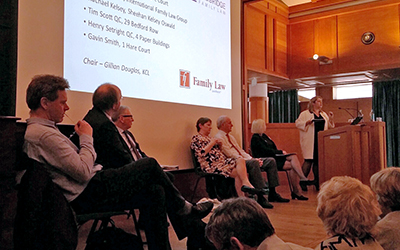 Cambridge Family Law was delighted to host this joint event, generously supported by the CFLQ’s publisher, LexisNexis, at Trinity College in March 2017.
Cambridge Family Law was delighted to host this joint event, generously supported by the CFLQ’s publisher, LexisNexis, at Trinity College in March 2017.
Quite fortuitously, the conference happened to fall between two important events: the publication just days earlier of key Parliamentary committee reports on the implications of Brexit for transnational litigation, including in family cases, and the UK’s formal notification of its intention to leave the EU, issued just a couple of days after the conference.
The conference provided an opportunity for legal academics, practitioners and students to come together to explore the various ramifications of Brexit across the full range of family law issues, including: recognition of divorce and enforcement of associated orders; jurisdiction in relation to divorce, private and public children matters, maintenance and other financial arrangements on divorce; international child abduction; and family migration.
The event attracted over 80 participants, including representatives from some EU-27 governments and Central Authorities. Our expert academic and practitioner speakers between them brought a vast experience, not just in terms of scholarship and general legal practice in this area, but also direct experience of litigating leading cases in the highest UK and European courts and negotiating key international instruments in transnational family justice. All this made for a lively, in-depth and often contested discussion – the metaphor of "divorce" was particularly apt and every effort made to ensure the discussions remained amicable!
Some key problems and questions that emerged in discussion at the end of the day included:
- the adequacy or otherwise of alternative "fall back" options, in particular the work of the Hague Conference and its potential (or otherwise) for creating better, more global solutions;
- the potential (or otherwise) of adopting a formula that requires UK courts to take "due account" of CJEU judgments;
- the difficulties of adequately regulating intra-UK family litigation;
- the legitimacy of using secondary legislation to enact new rules to deal with transnational family justice matters;
- the likely burden on an already badly over-stretched domestic family justice system of the years of legal uncertainty following the major legal dislocation that will inevitably arise; and
- probable "red line" issues for both the UK and the EU in the forthcoming negotiations.
What strategy each negotiating party adopts in those impending "divorce" proceedings remains to be seen: will transnational family justice be a very small cog in a much larger machine that, for that reason, is in danger of being overlooked? Or will its apparently minor status make it a subject on which an early, easy "win" for both sides can be agreed? Either way, however "minor" the issues may appear to outsiders in the broader scheme of Brexit, they are of critical importance to the individuals and families concerned.
The CFL website has full information on speakers and the programme. Several of the papers from the conference will be published in a special issue of the Child & Family Law Quarterly in the autumn.
Generously supported by:



 Twitter
Twitter Email
Email